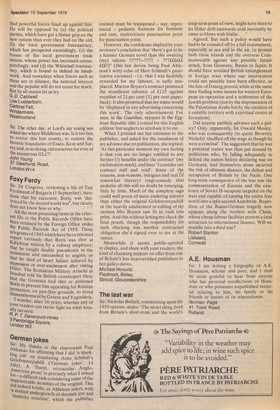The last war
Sir: Nicholas Bethel!, commenting upon the 1939 options, states: 'The smart thing, both from Britain's short-term and the world's long-term point of view, might have been to let Hitler drift eastwards until inevitably he came to blows with Stalin . . . '
Agreed. But such a policy would have had to be rounded off by a full rearmament, especially at sea and in the air, to protect both these islands and the overseas Commonwealth against any possible future attack, from Germany, Russia or Japan. It should have avoided British entanglement in foreign wars where our intervention could not possibly have been effective, as the fate of Danzig proved, while at the same time finding some means for western European co-operation and a settlement of the Jewish problem (not by the dispossession of the Palestinian Arabs but by the creation of a suitable territory with a spiritual centre at Jerusalem).
Did anyone publicly advance such a policy? Only, apparently, Sir Oswald Mosley, who was consequently (to quote Beverley Nichols) 'shuffled off the stage as though he were a criminal'. The suggestion that he was a potential traitor was then put around by politicians who, by failing adequately to defend the nation before declaring war on Germany, had themselves alone incurred the risk of ultimate disaster, the defeat and occupation of Britain by the Nazis. One long-term consequence of the war was the communisation of Eurasia and the existence of Soviet H-weapons targeted on the west and capable of turning the entire free world into a split-second Auschwitz. Repetition of the Russo-German tragedy now appears along the borders with China, whose cheap-labour facilities present a fatal attraction to international finance. Will we muddle into a third war?
Robert Stanton Liskeard, Cornwall


































 Previous page
Previous page